裕兴新概念英语第二册笔记_第2课_课文讲解
- 格式:pdf
- 大小:555.86 KB
- 文档页数:3
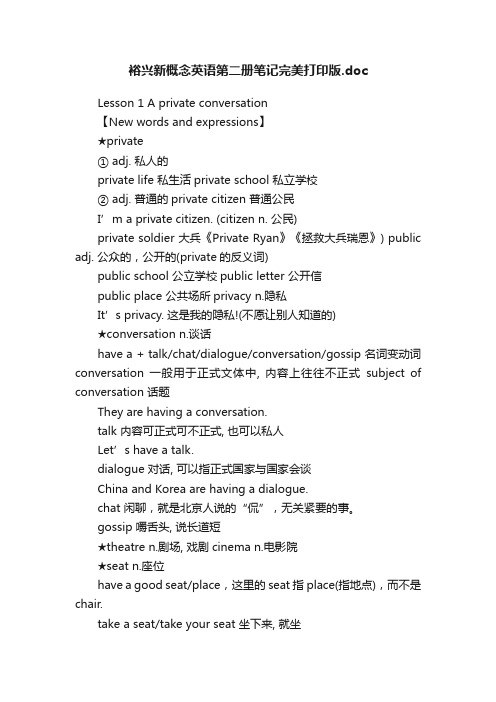
裕兴新概念英语第二册笔记完美打印版.docLesson 1 A private conversation【New words and expressions】★private① adj. 私人的private life 私生活private school 私立学校② adj. 普通的private citizen 普通公民I’m a private citizen. (citizen n. 公民)private soldier 大兵《Private Ryan》《拯救大兵瑞恩》) public adj. 公众的,公开的(private的反义词)public school 公立学校public letter 公开信public place 公共场所privacy n.隐私It’s privacy. 这是我的隐私!(不愿让别人知道的)★conversation n.谈话have a + talk/chat/dialogue/conversation/gossip 名词变动词conversation 一般用于正式文体中, 内容上往往不正式subject of conversation 话题They are having a conversation.talk 内容可正式可不正式, 也可以私人Let’s have a talk.dialogue 对话, 可以指正式国家与国家会谈China and Korea are having a dialogue.chat 闲聊,就是北京人说的“侃”,无关紧要的事。
gossip 嚼舌头, 说长道短★theatre n.剧场, 戏剧cinema n.电影院★seat n.座位have a good seat/place,这里的seat指place(指地点),而不是chair.take a seat/take your seat 坐下来, 就坐Is the seat taken? 这个位置有人吗?请坐的3种说法:Sit down, please. (命令性)Take your seat, please.Be seated, please. (更礼貌)作为动词的seat与sit的区别sit(sat,)vi. 就座He is sitting there.他坐在那儿。
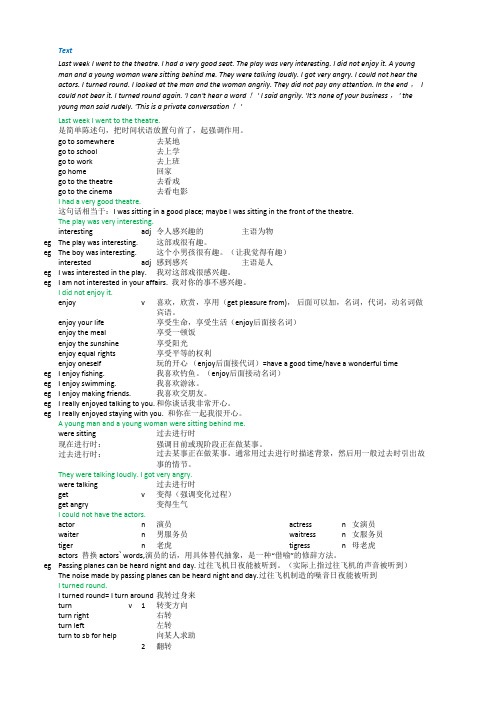
TextLast week I went to the theatre.是简单陈述句,把时间状语放置句首了,起强调作用。
go to somewhere 去某地go to school 去上学go to work 去上班go home 回家go to the theatre 去看戏go to the cinema 去看电影I had a very good theatre.这句话相当于:I was sitting in a good place; maybe I was sitting in the front of the theatre.The play was very interesting.interesting adj 令人感兴趣的 主语为物eg The play was interesting.这部戏很有趣。
eg The boy was interesting.这个小男孩很有趣。
(让我觉得有趣)interested adj 感到感兴主语是人eg I was interested in the play.我对这部戏很感兴趣。
eg I am not interested in your affairs. 我对你的事不感兴趣。
I did not enjoy it.enjoy v enjoy your life 享受生命,享受生活(enjoy 后面接名词)enjoy the meal 享受一顿饭enjoy the sunshine 享受阳光enjoy equal rights 享受平等的权利enjoy oneself 玩的开心 (enjoy 后面接代词)=have a good time/have a wonderful time eg I enjoy fishing.我喜欢钓鱼。
(enjoy 后面接动名词)eg I enjoy swimming.我喜欢游泳。
eg I enjoy making friends.我喜欢交朋友。

裕兴新概念英语第二册笔记First listen and then answer the question. 听录音,然后回答以下问题。
What was the polite request? If you park your car in the wrong place, a traffic policeman will soon find it. 一旦你把汽车停错了地方,交通警很快就会发现。
You will be very lucky if he lets you go without a ticket. 如果他没给你罚单就放你走了,算你走运。
However, this does not always happen. 然而,情况并不都是这样,Traffic police are sometimes very polite. 交通警有时也很客气。
During a holiday in Sweden, 有一次在瑞典度假,I found this note on my car: 'sir, we welcome you to our city. 我发现我的车上有这样一个字条:“先生,欢迎您光临我们的城市。
This is a "No Parking" area. 此处是‘禁止停车’区。
You will enjoy your stay here if you pay attention to our street signs. 如果您对我们街上的标牌稍加注意,您在此会过得很愉快的。
This note is only a reminder. “谨此提请注意。
”If you receive a request like this, you cannot fail to obey it! 如果你收到这样的恳求,你是不会不遵照执行的!Lesson 16 A polite request 【New words and expressions】(9)★park v. 停放(汽车)parking area 停车场★traffic n. 交通traffic police 交通警traffic lights 交通灯,另义为拐弯口, 红绿灯, 十字路口traffic jam 交通堵塞I spend a lot of time in traffic jam heavy traffic 繁重的交通I was ordered to drive in heavy traffic. (交通拥挤) first crossing/turning 叉路口, 拐角★note n.便条;n. 纸条, 纸钞make notes 做笔记message n. 消息★area n. 地段area n. 场地, 地段(一块对方), 大地点, 小地点都可以place n. 地点region n. 地区(交战, 开火)In this region, there were a lot of wars. 战火连绵★reminder n. 提示(可以指人,也可以指物, remind v. 提示, 提醒remind sb. of sth. You remind me of your mother. remind sb. to do sth. ★fail v. 无视, 忘记,失败①vi. 失败fail+宾语做某事失败fail (in) doing sth. 在某些方面失败(in 可省略) He failed (in) examination. ②vi. 不及格③vt. 使……不及格The teacher said he would fail me if I don’t work harder. ④vt. 未能……,不能……,忘记……(后接不定式)fail to do sth. 没有能够做某事,忘记做……not fail to do sth. 一定能够某事You can not fail to drive it. 你一定能够驾驶If you arrived in Beijing, you cannot fail to find the New Oriental School. 【课文讲解】1、If you park your car in the wrong place, a traffic policeman will soon find it. 英语中指每个人/任何人的不定代词通常是one,但在日常会话中,非正式的you更为常用。

单词学习jazz n.爵士音乐classical music 古典音乐folk music 民族音乐country music 乡村音乐pop (popular) music 流行音乐jazz 爵士音乐play jazz 演奏爵士乐eg.They tried to play jazz on the piano.他们试图在钢琴上演奏爵士音乐。
rock and roll 摇滚乐rap 拉普乐(说唱音乐)musical adj.音乐的music [U]a piece of music 一首音乐concert ['kɔnsət] [C] 音乐会musical adj.音乐的musician n.音乐家a music lesson 一堂音乐课a music teacher 音乐教师a music lover 音乐爱好者a piece of music 一首音乐face the music 面对失败;面对不愿面对而又不得不面对之事(说法: 1.新演员初上舞台非常紧张, 但是音乐响起了, 不得不上舞台, 必须去面对音乐, 面对自己不敢面对的事情;2.新兵入伍后参与军事检阅, 军乐响起来了, 不得不按照节拍去走, 哪怕再紧张也没有用。
)a musical instrument 一件乐器a misical performance 乐器演奏a musical score [skɔ:] 乐谱musical voice 美妙的声音instrument1) 器具, 仪器torture ['tɔ:tʃə] instruments 刑具operation instruments 手术器械2) 乐器musical instrument 乐器-----What kind of musical instrument can you play? 你会演奏哪种乐器呢?-----I can play the guitar.我会弹吉他。

新概念英语第二册笔记(精美打印版)第一课:A private conversation 私人谈话课文概述本课程主要讲述了两个人之间的私人谈话,包括他们的家庭、工作和个人兴趣等方面。
重点词汇- private conversation: 私人谈话- employee: 员工- dentist: 牙医- individually: 分别地- keen on: 热衷于- instead: 反而课文详述课文中的两位对话者都是职业人士。
他们讨论了彼此的职业以及为什么选择这样的职业。
第一位对话者是一位雇主,他说自己的员工做事不利索,需要手把手地指导。
他所雇佣的人中,有一位牙医,这位牙医个人能力很强,但做事不守规矩。
第二位对话者是一位操控电视卫星的技术员,他对自己的工作很满意。
他认为这份工作能提供稳定的收入,而且他对这个技术很感兴趣。
相比之下,他并不喜欢在办公室工作。
他坚信个人的兴趣和爱好应该引导自己的职业选择,而不仅仅是为了赚钱。
在谈论个人爱好时,两位对话者发现他们都对音乐很感兴趣。
然而,他们的爱好有所不同。
第一位对话者表示,他喜欢个别的音乐会,而不是大型音乐会。
第二位对话者则喜欢大型音乐会,认为那种氛围和观众的热情是独一无二的。
课后练1. 为什么第一位对话者对自己的员工感到不满意?2. 第二位对话者为什么喜欢做电视卫星的技术员?3. 两位对话者的音乐兴趣有何不同?参考答案1. 第一位对话者对自己员工感到不满意是因为他们做事情不利索,需要手把手地指导。
2. 第二位对话者喜欢做电视卫星的技术员是因为这份工作能提供稳定的收入,而且他对这个技术很感兴趣。
3. 两位对话者的音乐兴趣不同。
第一位对话者喜欢个别的音乐会,而第二位对话者喜欢大型音乐会。

新概念英语二 Lesson 2Lesson 2 Breakfast or lunch?First listen and then answer the question. 听录音,然后回答以下问题。
Why was the writer's aunt surprised?It was Sunday. I never get up early on Sundays. I sometimes stay in bed until lunch time. Last Sunday I got up very late. I looked out of the window. It was dark outside. ‘What a day!' I thought.‘It's raining again.' Just then, the telephone rang. It was my aunt Lucy. ‘I've just arrived by train,' she said. ‘I'm coming to see you.'‘But I'm still having breakfast,' I said.‘What are you doing?' she asked.‘I'm having breakfast,' I repeated.‘Dear me,' she said. ‘Do you always get up so late? It's one o'clock!'New words and expressions 生词和短语until prep. 直到 outside adv. 外面ring v. (铃、电话等)响 aunt n. 姑,姨,婶,舅母repeat v. 重复Note on the text 课文注释1 on Sundays, 指每个星期日。
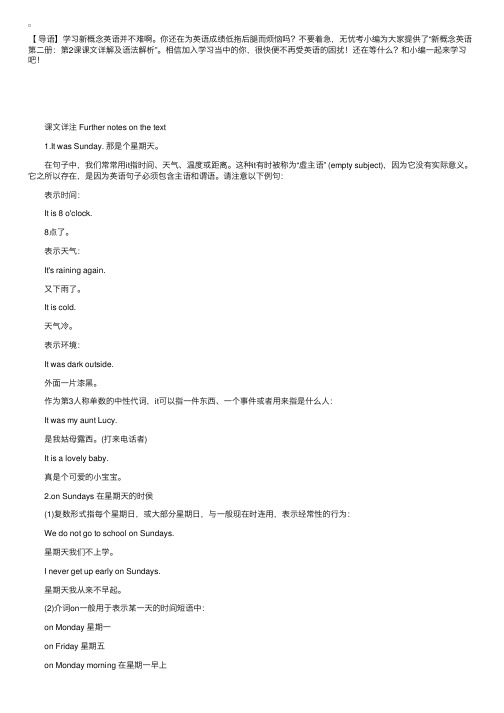
【导语】学习新概念英语并不难啊。
你还在为英语成绩低拖后腿⽽烦恼吗?不要着急,⽆忧考⼩编为⼤家提供了“新概念英语第⼆册:第2课课⽂详解及语法解析”。
相信加⼊学习当中的你,很快便不再受英语的困扰!还在等什么?和⼩编⼀起来学习吧! 课⽂详注 Further notes on the text 1.It was Sunday. 那是个星期天。
在句⼦中,我们常常⽤it指时间、天⽓、温度或距离。
这种it有时被称为“虚主语” (empty subject),因为它没有实际意义。
它之所以存在,是因为英语句⼦必须包含主语和谓语。
请注意以下例句: 表⽰时间: It is 8 o'clock. 8点了。
表⽰天⽓: It's raining again. ⼜下⾬了。
It is cold. 天⽓冷。
表⽰环境: It was dark outside. 外⾯⼀⽚漆⿊。
作为第3⼈称单数的中性代词,it可以指⼀件东西、⼀个事件或者⽤来指是什么⼈: It was my aunt Lucy. 是我姑母露西。
(打来电话者) It is a lovely baby. 真是个可爱的⼩宝宝。
2.on Sundays 在星期天的时侯 (1)复数形式指每个星期⽇,或⼤部分星期⽇,与⼀般现在时连⽤,表⽰经常性的⾏为: We do not go to school on Sundays. 星期天我们不上学。
I never get up early on Sundays. 星期天我从来不早起。
(2)介词on⼀般⽤于表⽰某⼀天的时间短语中: on Monday 星期⼀ on Friday 星期五 on Monday morning 在星期⼀早上 on that day 在那⼀天 当我们使⽤last, next和this, that时,介词(以及定冠词)必须省略: I'll see you next/this Friday. 下个/这个星期五再见。
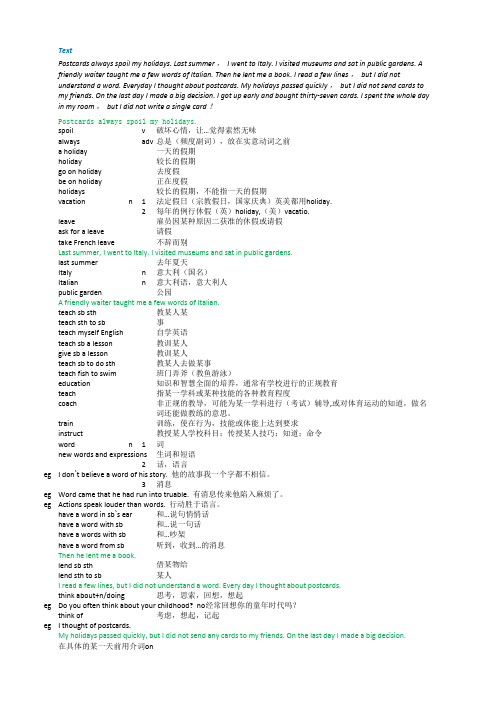

Lesson 2 - Breakfast or lunch?TextIt was Sunday.I never get up early on Sundays.I sometimes stay in bed until st Sunday,I got up very late.I looked out of the window.It was dark outside."What a day!"I thought.It's raining again.Just then,the telephone rang.It was my aunt Lucy."I've just arrived by train."she said."I'm coming to see you.""But I'm still having breakfast."I said."What are you doing?"She asked."I'm having breakfast."I repeated."Dear me!"She said."Do you always get up so late?It's one o'clock."New words and expressions 生词和短语until prep. 直到outside adv. 外面ring v. (铃、电话等)响aunt n. 姑,姨,婶,舅母repeat v. 重复Note on the text 课文注释1 on Sundays, 指每个星期日。
星期几的前面用介词on。
2 What a day! 多么糟糕的天气!这是一个省略的感叹句。
完整的句子应该是Whata day it is!英语中的感叹句常用what开头,后面紧跟一个名词或名词性短语(包括连系动词),然后是主语和谓语,句尾用感叹号。
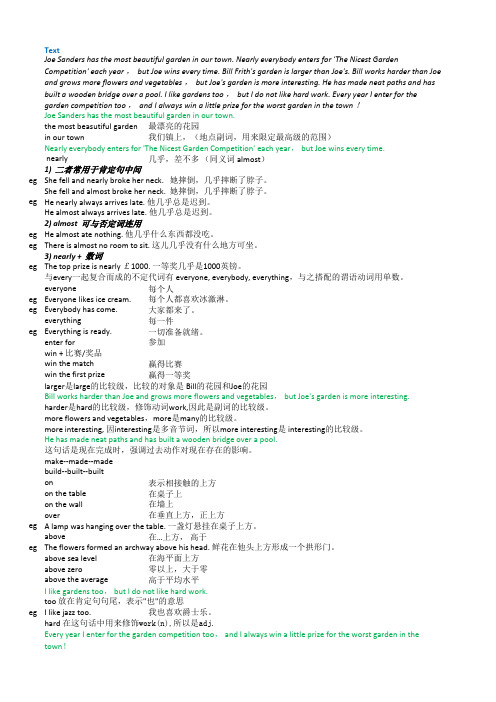
Text Joe Sanders has the most beautiful garden in our town.the most beasutiful garden 最漂亮的花园in our town 我们镇上,(地点副词,用来限定最高级的范围)Nearly everybody enters for 'The Nicest Garden Competition' each year , but Joe wins every time. nearly 几乎,差不多 (同义词 almost )1) 二者常用于肯定句中间egShe fell and nearly broke her neck. 她摔倒,几乎摔断了脖子。
She fell and almost broke her neck. 她摔倒,几乎摔断了脖子。
egHe nearly always arrives late. 他几乎总是迟到。
He almost always arrives late. 他几乎总是迟到。
2) almost 可与否定词连用egHe almost ate nothing. 他几乎什么东西都没吃。
egThere is almost no room to sit. 这儿几乎没有什么地方可坐。
3) nearly + 数词egThe top prize is nearly £1000. 一等奖几乎是1000英镑。
与every 一起复合而成的不定代词有 everyone, everybody, everything ,与之搭配的谓语动词用单数。
everyone 每个人egEveryone likes ice cream. 每个人都喜欢冰激淋。
egEverybody has come. 大家都来了。
everything 每一件事,每一egEverything is ready. 一切准备就绪。
enter for 参加win + 比赛/奖品win the match 赢得比赛win the first prize 赢得一等奖larger 是large 的比较级,比较的对象是 Bill 的花园和Joe 的花园Bill works harder than Joe and grows more flowers and vegetables , but Joe's garden is more interesting.harder 是hard 的比较级,修饰动词work,因此是副词的比较级。

TextOur dog,Rex, used to sit outside our front gate and back.used to do 过去常常做某事,常和现在状况形成对比outside 在外面outside our front gate, our front gate 做介词outside 的宾语inside 在里面inside the gate 在大门里面outside/insidean outside chance极小的机会,极小的可能性 (outside 在这里做adj,极小的)eg Please wait outside .请在外面等候。
(outside 在这里做地点adv)the outside of the house 房子的外面(outside 有冠词the 修饰,在这里做n)outsider n insider n insider dealing/ insider trading 内幕交易Every time he wanted to come into the garden he would bark until someone opend the gate.would 和every time 相搭配would do 表示过去某一段时间经常发生的动作(通常不很规律)untilnot…until直到…才(主句中的动词常为非延续性动词)eg We`ll stay at home until the rain stops. 我们会在家一直待到雨停为止。
(主句中stay 是个延续性动词)eg We won`t start until the rain stops. 直到雨停止我们才会出发。
(主句中start 是个非延续性动词)complain of 抱怨;病人对医生诉说病痛complain (to sb) about (sth) 抱怨eg He began to complain about the wicked world. 他开始抱怨这个邪恶的世界。

TextI love travelling in the country, but I don't like losing my way.I went on an excursion recently, but my trip took melonger than I expected.'I'm going to Woodford Green,' I said to the conductor as I got on the bus, 'but I don't know where it is.''I'll tell you where to get off.' answered the conductor.I sat in the front of the bus to get a good view of the countryside. After some time, the bus stopped. Looking round, I realized with a shock that I was the only passenger left on the bus.'You'll have to get off here,' the conductor said. 'This is as far as we go.''Is this Woodford Green?' I asked.'Oh dear,' said the conductor suddenly. 'I forgot to put you off.''It doesn't matter,' I said. 'I'll get off here.''We're going back now,' said the conductor.Taken for a ride 被当作是乘车兜风take for 把…认为是,把…看成为;take sb for a ride 欺骗某人, 诈骗某人标题相关 1乘车兜风2我被骗了I love travelling in the country, but I don't like losing my way.我喜欢在乡间旅行, 但却不愿意迷路.love to do一次性喜欢like to do一次性喜欢prefer to do一次性喜欢love doing长期性喜欢like doing长期性喜欢prefer doing长期性喜欢love to do 想要做某事love doing 喜欢做enjoy doing 喜欢做eg Love me , love my dog. 爱屋及乌lose one’s way 迷路;lose one’s job 失业lose one’s face 丢脸lose one’s temper 失去控制,发脾气lose weight减肥put on weight 增加体重、加胖lose one’s cool 沉不住气、失控发火keep one’s cool保持镇定lose one’s head 昏了头,冲动keep one’s shirt on 保持冷静;lose one’s life丧命lose one’s breath 喘不过气来,呼吸困难、喘息,上气不接下气lose oneself 沉迷于eg He lost himself in reading . 他沉迷于读书.区别 lose , loose , misslose [lu:z] v丢失;迷失(lost - lost)eg I don’t like losing my way.我不喜欢迷路。

裕兴新概念第二册学习笔记3课解析Lesson 3 Please Send Me a Card 请给我寄张明信片一、单词讲解:【New words and expressions】生词和短语(11)send(sent/sent/sending) v. 寄,送postcard n. 明信片spoil [spoiled(spoilt)] v. 使索然无味,损坏museum n. 博物馆public adj. 公共的friendly adj. 友好的waiter n. 服务员,招待员lend(lent/lent/lending) v. 借给decision n. 决定whole adj. 整个的send 寄,送,派遣,打发派遣,cause sb to go or sth to be taken without going oneself (send/ sent/sent ) 1)加双宾语send sb sth = send sth to sb 把东西寄给某人eg. Send me a postcard = Send a postcard to me寄给我一张明信片.eg. I sent my mother a present on Mother’s day.在母亲节那天我寄给妈妈一份礼物。
=I sent a present to my mother on Mother’s day.2)加单宾语send sth 寄什么东西send sb 派遣,打发某人send a letter 寄信send a parcel 寄包裹send the children to bed 打发孩子去睡觉3)send sb my love = give sb my love 代我向...致意eg. Please send your sister my love. =Please send my love to your sister.请把我的问候带给你的姐姐。

TextJeremy Hampden has a large circle of friends and is very popular at parties.a large circle of friends 交际广泛be popular with受…的欢迎eg The nurse is very popular with little children. 那个保育员非常受小孩子们的欢迎。
be popular among sb 在某人中间受欢迎eg Chinese food is coming popular among Americans. 中餐越来越受美国人的欢迎了。
popular newspaper 大众报纸popular opinion 舆论popular government 民主政治party 1n 聚会,团,一行,一伙at parties 在各种聚会中have a party / give a party 聚会a party of tourists 旅行团tourist n the climbing party 登山者一行eg The president and his party started for Geneva. 总统一行今日启程前往日内瓦。
2n the party concerned 当事者admire sb for sth钦佩某人某事(因为…而钦佩某人)a sense of humor 幽默感sense 1a musical sense 音乐感eg He has no sense of business. 他没有经商意识。
2意念,意识a sense of hunger 饥饿感a sense of shame 羞耻感a sense of responsibility 责任感a moral sense 道德观3common sense 常识a man of good sense 同情达理的人4eg She lost her senses when she heard the news. 听到这个消息她失去了理智。

Lesson 1 A private conversation【New words and expressions】★private① adj. 私人的private life 私生活private school 私立学校② adj. 普通的private citizen 普通公民I’m a private citizen. (citizen n. 公民)private soldier 大兵《Private Ryan》《拯救大兵瑞恩》) public adj. 公众的,公开的(private的反义词)public school 公立学校public letter 公开信public place 公共场所privacy n.隐私It’s privacy. 这是我的隐私!(不愿让别人知道的)★conversation n.谈话have a + talk/chat/dialogue/conversation/gossip 名词变动词conversation 一般用于正式文体中, 内容上往往不正式subject of conversation 话题They are having a conversation.talk 内容可正式可不正式, 也可以私人Let’s have a talk.dialogue 对话, 可以指正式国家与国家会谈China and Korea are having a dialogue.chat 闲聊,就是北京人说的“侃”,无关紧要的事。
gossip 嚼舌头, 说长道短★theatre n.剧场, 戏剧cinema n.电影院★seat n.座位have a good seat/place,这里的seat指place(指地点),而不是chair.take a seat/take your seat 坐下来, 就坐Is the seat taken? 这个位置有人吗?请坐的3种说法:Sit down, please. (命令性)Take your seat, please.Be seated, please. (更礼貌)作为动词的seat与sit的区别sit(sat,)vi. 就座He is sitting there.他坐在那儿。
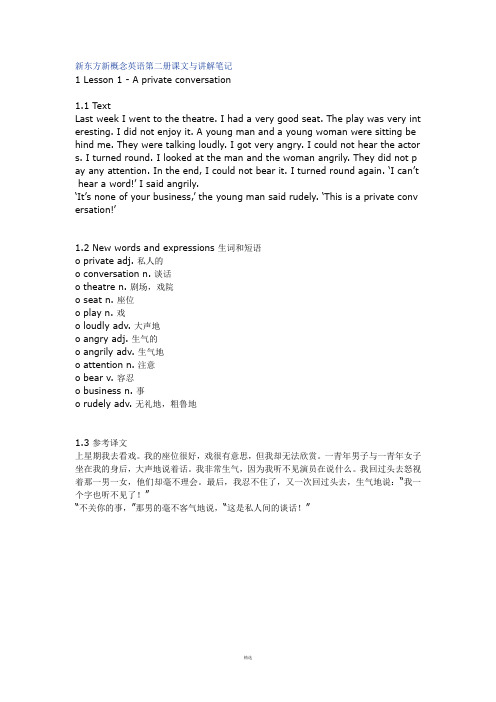
新东方新概念英语第二册课文与讲解笔记1 Lesson 1 - A private conversation1.1 TextLast week I went to the theatre. I had a very good seat. The play was very int eresting. I did not enjoy it. A young man and a young woman were sitting be hind me. They were talking loudly. I got very angry. I could not hear the actor s. I turned round. I looked at the man and the woman angrily. They did not p ay any attention. In the end, I could not bear it. I turned round again. ‘I can’t hear a word!’ I said angrily.‘It’s none of your business,’ the young man said rudely. ‘This is a private conv ersation!’1.2 New words and expressions 生词和短语o private adj. 私人的o conversation n. 谈话o theatre n. 剧场,戏院o seat n. 座位o play n. 戏o loudly adv. 大声地o angry adj. 生气的o angrily adv. 生气地o attention n. 注意o bear v. 容忍o business n. 事o rudely adv. 无礼地,粗鲁地1.3 参考译文上星期我去看戏。

Lesson 49 The end of a dream美梦告终How did the dream endTired of sleeping on the floor, a young man in Teheran saved up for years to buy a real bed. For the first time in his life, he became the proud owner of a bed which had springs and a mattress. Because the weather was very hot, he carried the bed on to the roof of his house. He slept very well for the first two nights, but on the third night, a storm blew up. A gust of wind swept the bed off the roof and sent it crashing into the courtyard below. The young man did not wake up until the bed had struck the ground. Although the bed was smashed to pieces, the man was miraculously unhurt. When he woke up, he was still on the mattress. Glancing at the bits of wood and metal that lay around him, the man sadly picked up the mattress and carried it into his house. After he had put it on the floor, he promptly went to sleep again.参考译文德黑兰的一个人年轻人由于对睡地板感到厌倦,于是积蓄多年买了一张真正的床。
![[新概念英语第二册课文翻译及学习笔记:Lesson2] 新概念二课后所有答案](https://img.taocdn.com/s1/m/3063d5da453610661fd9f433.png)
[新概念英语第二册课文翻译及学习笔记:Lesson2] 新概念二课后所有答案新概念英语网权威发布新概念英语第二册课文翻译及学习笔记:Lesson2,更多新概念英语第二册课文翻译及学习笔记相关信息请访问新概念英语网。
【导语】新概念一共144课,其中单课为课文,双课为语法和练习。
整本书是以单数课为正课,并附带有插图而双数课则是针对单数课所讲的内容有针对性地进行练习,从此出展现出整个新概念一教材区别于其他教材的独特之处。
【课文】Firstlistenandthenanswerthequestion.听录音,然后回答以下问题。
Whywasthewriter'sauntsurprised?ItwasSunday.InevergetupearlyonSundays.Isometimesstayinb stSundayIgotupverylate.Ilookedoutoft hewindow.Itwasdarkoutside.'Whataday!'Ithought.'It'srain ingagain.'Justthen,thetelephonerang.ItwasmyauntLucy.'I' vejustarrivedbytrain,'shesaid.'I'mcomingtoseeyou.''ButI'mstillhavingbreakfast,'Isaid.'Whatareyoudoing?'sheasked.'I'mhavingbreakfast,'Irepeated.'Dearme,'shesaid.'Doyoualwaysgetupsolate?It'soneo'clock !'【课文翻译】那是个星期天,而在星期天我是从来不早起的,有时我要一直躺到吃午饭的时候。
TextIt was Sunday. I never get up early on Sundays. I sometimes stay in bed until lunchtime. Last Sunday I got up very late. I looked out of the window. It was dark outside. 'What a day!' I thought. 'It's raining again.' Just then, the telephone rang. It was my aunt Lucy. 'I've just arrived by train,' she said. 'I'm coming to see you.' 'But I'm still having breakfast,' I said. 'What are you doing?' she asked. 'I'm having breakfast,' I repeated. 'Dear me,' she said. 'Do you always get up so late? It's one o'clock!'It was Sunday.I never get up early on Sundays.was 表示过去时,那是个星期天。
on Sundays每逢星期天never adv从未,未曾,永不eg I have never been abroad.我从未出过国。
eg Would you do that ? -- Never.你会做那件事情吗?绝不会。
eg I never get up before 10 o`clock in mornings.eg Never fear.不要害怕。
eg Never give up.永不放弃eg Never say die.永不言败。
eg Never lose heart.决不要灰心丧气。
early adj/advan early morning一大早(early 修饰morning, 做adj)eg The early bird catches the worm. 早起的鸟儿有虫吃。
eg I got up early this morning.今天早上我起的很早。
(early修饰get,做adv)I sometimes stay in bed until lunchtime.stay in bed躺在床上stay at home呆在家里sometimes有时候some times几次;几倍some time 一段时间sometime 将来或过去的某个时候eg I will be somebody sometime in the future. 总有一天我将是个大人物。
Last Sunday I got up very late.get up起床go to bed去睡觉fall asleep睡着了go to sleep睡着了late adj/adv晚eg I am sorry for being late.对不起我来晚了。
(for being late,late做系动词be的表语,是adj,迟到)eg I got up very late.我起床很晚。
(late修饰动词get,是adv)stay up late熬夜(late 修饰stay,是adv)lately adv最近(recently)lately通常用在现在完成时和一般过去时中。
eg Have you been abroad lately?你最近出国了吗?eg I bought a new car lately.最近我买了一辆新车。
I looked out of the window.look out of向…外看look out of the door向门外看look into1向…里看look into the box向盒子里看2调查,分析eg The police are looking into case. 警察正在调查这个案件。
look out!小心,当心!(在紧急情况下的提醒)eg Look out! The car nearly knocked you over. 当心,这辆车差点撞到你了。
It was drak outside.`What a day!` I though.what a day.多糟糕的天气呀(全称=what a terrible day!)eg what a wonderful day天气多好呀。
what a lively day!What a beautiful day!`It`s raining again.` Just then, the telephone rang. It was my aunt Lucy.just then就在那一刻(at that moment)it 是虚主语,印在在接电话之前不知道对方是男还是女。
`I`ve just arrived by train,` She said. `I`m coming to see you.`by train 坐火车by bus 乘公共汽by plane/by air 坐飞机by ship/by sea/by water 坐船by car 开车用“by+交通工具”来表示一种方式或手段,前后不加冠词on foot 走路egI came he on foot.我走路过来的。
(I walked here )egWe got into the mountain on horseback. 我们骑马上山的。
take a train 乘坐火车take a bus 乘坐公共汽车take a car 乘坐小汽车take a plane 乘飞机take a ship 乘坐轮船take +冠词+交通工具,强调动作本身,即强调交通方式的动作egIn order to go to school on time, I take a taxi. 为了准时上学,我搭了一辆出租车。
`But I`m still having breakfast,` I said.have breakfast 吃早饭前面不见任何冠词have lunch 吃中饭have supper 吃晚餐have dinner 吃晚餐(正餐)have a meal 吃一顿饭`What are you doing?` She asked .`I am having breakfast.` I repeated.repeat v 重复`Dear me,` she said. `Do you always get up so late? It`s one o`clock!`Dear me!天哪!My God!It 做虚主语It`s one o`clock (时间)it`s cold in winter (气候)冬天很冷it`s only me (人)是我呀it`s a way from here (距离)离这里很远it`s very dirty here (环境)这儿很脏。
Special Difficulties 感叹句1:what 引导what+a/an+adj+n+主语+谓语egWhat a terrible day(it is)!it is (主谓)通常被省略2:How 引导how+adj+a/an+n+主语+谓语eg How terrible a day(it is)!it is (主谓)通常被省略区别:"what"修饰1This is a wonderful garden!What a wonderful garden this is.How wonderful a garden this is!2This is a surprise!(这句不能用how 引导,没有adj/adv)What a surprise this is.3He is cause a lot of trouble!他正在导致许多麻烦!What a lot of trouble he is causing!4They are wonderful actors!他们是极棒的演员。
(复数名词用what 引导)What wonderful actors they are!5She is a hard-working woman!What a hard-working woman she is!How hard-working a woman she is!6It is a tall building!What a tall building it is!How tall a building it is!7It`s a terrible film!What a terrible film it is!(后面是一个名词短语,不存在adj,所以只能用what 引导)I am coming to see you 字面上是“be doing”结构,但come 可用于进行时态来表达即将发生的动作, 即“我就来看你了”How terrible a film it is!8You are a clever boy!What a clever boy you are!How clever you are!9She is a pretty girl!What a pretty girl she is!How pretty a girl she is!10He is a strange guy!What a strange guy he is!How strange a guy he is!Exercises1He doean`t get up early on Sundays. He gets up late.A late adj/adv迟,晚B lately adv最近地C slowly adv慢地D hardly adv几乎不2Just then, the telephone rang. It rang at that moment.A at once立即,马上B immediately立即,马上C again再一次D at that moment就在那个时候3Breakfast is the first meal of the day.A food n食品B dinner n正餐C lunch n午餐D meal n一顿饭4 A child has absolute trust in it`s mother.A absolute adj绝对的,完全的B reliable adj可靠的,可依赖的C preferable adj更令人喜欢的D countless adj数不清的孩子对其母亲有着绝对的信任。